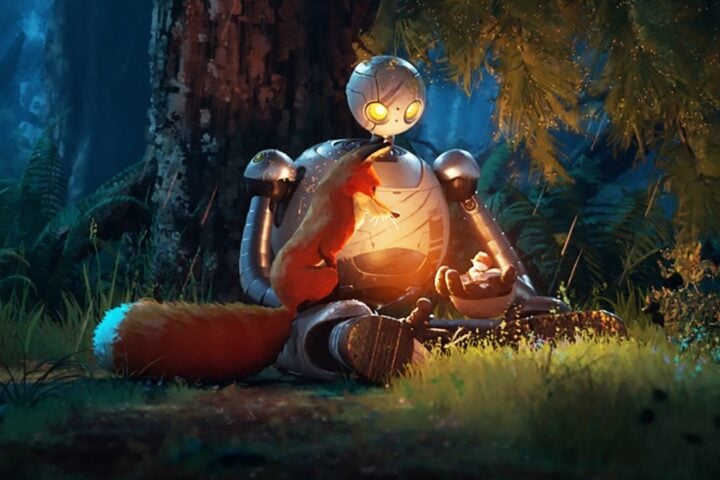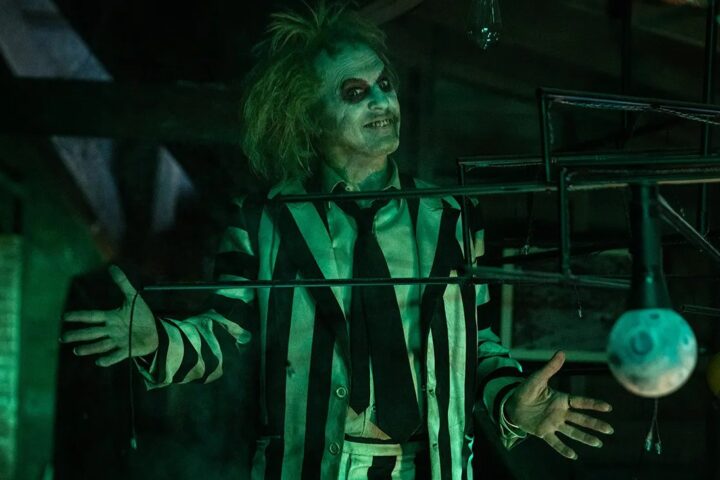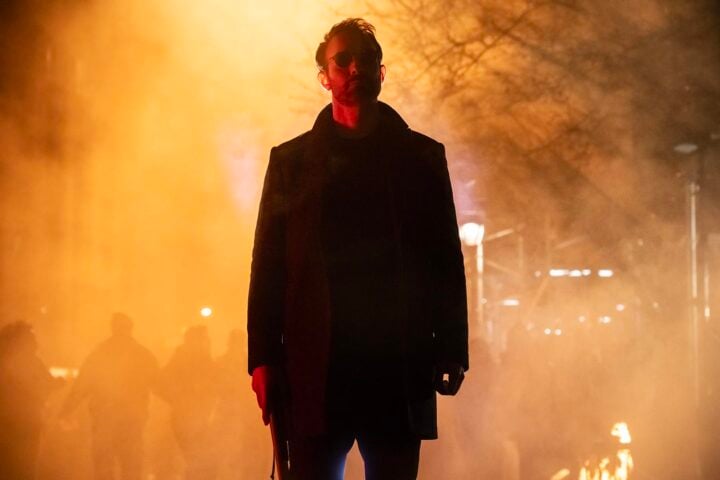When film-loving studio exec Matt Remick (Seth Rogen) is appointed as the new head of Continental Studios, he finds that his dream job poses an immediate existential crisis. While he wants to champion auteur-driven works of art, the studio only cares about finding its next billion-dollar IP, even if it means making a feature film about the Kool-Aid Man.
Each episode of The Studio introduces a new crisis for Matt to navigate, whether it’s a missing film reel or an upcoming CinemaCon presentation. Many of them take a meta approach, like the episode that takes place on the set of a new noir film that quickly turns into its own hardboiled mystery, complete with husky voiceover narration from Matt. Or the one that revolves around the attempt to capture an elaborate “oner,” with the episode itself shot to look like one long take.
Whatever Matt is dealing with, the camera follows him around in long tracking shots, usually to the sound of skittering jazz drums. It’s not an especially original way to conjure the chaos of behind-the-scenes Hollywood, but it meshes well with the show’s bite-sized storylines and light-hearted tone, making The Studio an effortlessly binge-able series.
Each episode contains at least one famous actor or director, who are more than happy to be the butt of the joke, from Greta Lee’s self-portrayal as a suck-up to Nicholas Stoller copping to his reputation as the sort of mass-market filmmaker who might end up landing a gig like The Kool-Aid Movie. And while some of the gags about the industry function more as “I understood that reference” prompts than actual jokes—like a nod to “that weird Volume stage they shoot The Mandalorian on”—the scripts by Rogen and co-creators Evan Goldberg, Peter Huyck, Alex Gregory, and Frida Perez also contain lots of great lines. Like when Lee complains that her Past Lives press tour was so cash-strapped that she “basically had to carve her own boat.”

The Studio’s comedy is at its best when it gets a little dark and more than a little pointed, as in Matt matching egos with a group of cancer doctors or spinning out over whether the casting decision he’s about to announce might be seen as racist. What could have been cheap anti-woke tirade on the part of the series is a sharply satirical jab at the way big studios tie themselves in knots obsessing over the most surface-level idea of “representation.” Matt’s rising hysteria as each new casting suggestion is adjudged to be “potentially problematic” is hilarious to behold.
There are times when you wish The Studio would lean into these edgier elements a little harder. In a desperate bid to turn his Kool-Aid movie into something meaningful, Matt briefly considers making it a Jim Jones biopic, which is the sort of sinisterly absurd conceit that could have been material for an entire season of BoJack Horseman. Another episode about filmmakers who use their personal trauma in their work opens up an intriguing line of questioning about where the line between artistic bravery and sheer self-indulgence lies. Sadly, both conflicts are tidily resolved before The Studio can really get its hands dirty with them.
The episodes that focus on these big-picture conundrums work much better than the ones that center Matt’s personal issues. His existential angst over making real art is undermined by the fact that his love of film is always depicted in the most generic of ways. Besides, most of his issues actually stem from an obsessive need for approval—especially from famous people—rather than any sort of artistic integrity. Rogen is such an eminently likeable screen presence that he still anchors the series nicely, but Matt works better as a character when he’s caught up in the conflicts of his underlings instead of agonizing over his own inner battles.
That’s especially true since those underlings are a lot of fun to watch. Ike Barinholtz plays a coked-up slimeball (his specialty) named Sal, while Chase Sui Wonders plays their ruthlessly ambitious younger colleague, Quinn. Then there’s Maya (Kathryn Hahn), the abrasive marketing guru who likes to storm into a room, sipping from a Stanley cup and bellowing about all the artsy shit that keeps making it harder for her to sell stuff.
By the end of the season, The Studio more or less becomes a cookie-cutter Seth Rogen hangout comedy as this bunch of endearing idiots rampage around, getting hammered and yelling out increasingly unhelpful solutions to increasingly stupid problems. It might not be the sort of prestigious art that Matt longs for, but it’s exactly the sort of show that streaming-era Hollywood is good at producing: familiar and perhaps a little forgettable but nonetheless fun.
Since 2001, we've brought you uncompromising, candid takes on the world of film, music, television, video games, theater, and more. Independently owned and operated publications like Slant have been hit hard in recent years, but we’re committed to keeping our content free and accessible—meaning no paywalls or fees.
If you like what we do, please consider subscribing to our Patreon or making a donation.





